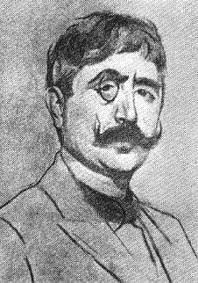This is an old revision of this page, as edited by Alexikoua (talk | contribs) at 06:08, 23 November 2009 (rm uncorfimed spa stuff). The present address (URL) is a permanent link to this revision, which may differ significantly from the current revision.
Revision as of 06:08, 23 November 2009 by Alexikoua (talk | contribs) (rm uncorfimed spa stuff)(diff) ← Previous revision | Latest revision (diff) | Newer revision → (diff)
| French and Francophone literature |
|---|
| by category |
| History |
| Movements |
| Writers |
| Countries and regions |
| Portals |
Jean Moréas (born Ioannis A. Papadiamantopoulos, Ιωάννης Α. Παπαδιαμαντόπουλος; April 15, 1856 - April 30, 1910), was a Greek poet, essayist, and art critic, who wrote mostly in French but also in Greek, in his youth.
Moréas was born into a distinguished Athenian family, the son of Adamantios Papadiamantopoulos, a judge, scholar and poet. He received a French education, and came to Paris in 1875 to study law at the University of Paris. While in France, he began to move in literary circles, and became acquainted with Les Hydropathes, a group of French writers that included Alphonse Allais, Charles Cros, Guy de Maupassant, and Léon Bloy. He was also an acquaintance of the Greek artist Demetrios Galanis and the Romanian poet Ion Minulescu.
He published poetry in Lutèce and Le Chat noir, and collected his poems into two editions, Les Syrtes ("The Sandbanks") and Cantilènes, which were strongly influenced by Paul Verlaine.
He was initially an adherent of the school of Symbolism, and wrote the Symbolist Manifesto (1886), which he published in Le Figaro, in part as a means of distancing the aesthetic of the rising generation of young writers from the "decadent" label that the press had placed on them. He was considered one of the most important Symbolist poets until the early 1890s.
In 1891, as Symbolism became more openly associated with anarchism, he published Le Pèlerin passioné which rejected Northern European and Germanic influences, such as Romanticism (as well as some aspects of Symbolism), in favor of Roman and Ancient Greek influences. This work laid the foundation for the École Romane, whose aesthetic provided Charles Maurras with the ideological framework for the far-right Action Française.
Moréas also wrote Les Demoiselles Goubert, a novel, in connection with Paul Adam. His most important publications were:
- Les Syrtes (1884)
- Les Cantilènes (1886)
- Le Pèlerin passioné (1891)
- Stances (1893)
- Contes de la vielle France (1904)
References
- Butler, J.D. Jean Moreas: A critique of his poetry and philosophy Mouton: 1967. p.176
- Rees, W. The Penguin book of French poetry 1820-1950: with prose translations. London:Penguin, 1975. p. 388
- Shipley, J.T.Modern French Poetry: An anthology. Ayer Publishing, 1972. p238.
- Τρυγόνες καί Έχιδνες - Vipers and Turtledoves (1873) collection of poems
- Walter L. Adamson. Embattled avant-gardes: modernism's resistance to commodity culture in Europe. University of California Press, 2007. ISBN 9780520252707, p. 70 "Moreas was of Greek origin..."
- William Rees. The Penguin book of French poetry: 1820-1950 : with prose translations. Penguin Classics, 1992. ISBN 9780140423853, p. 388 "of Greek ancestry and French education..."
- Edward A. Tiryakian. For Durkheim: Essays in Historical and Cultural Sociology. Ashgate Publishing, Ltd., 2009. ISBN 9780754671558, p. 157 "Jean Moreas, the Greek born poet
- Sir John Alexander Hammerton. Concise universal biography: a dictionary of the famous men and women of all countries and all times, recording the lives of more than 20,000 persons and profusely illustrated with authentic portraits and other pictorial documents. Gale Research Co., 1975. ISBN 9780810342095, p. "French poet. Born at Athens, of Greek ancestry."
External links
Further reading
- A. Embiricos, Les étapes de Jean Moréas, Lausanne, 1948
- R. Georgin, Jean Moréas, Paris, 1930
- Jean de Gourmont, Jean Moréas, Paris, 1905
- Robert Jouanny, Moréas, écrivain français, Paris, Lettres modernes, 1969
- R. Niklaus, Jean Moréas, a Critique of His Poetry and Philosophy, La Haye, 1967
- J. Weber, Jean Moréas u. die französische Tradition, Nuremberg, 1934